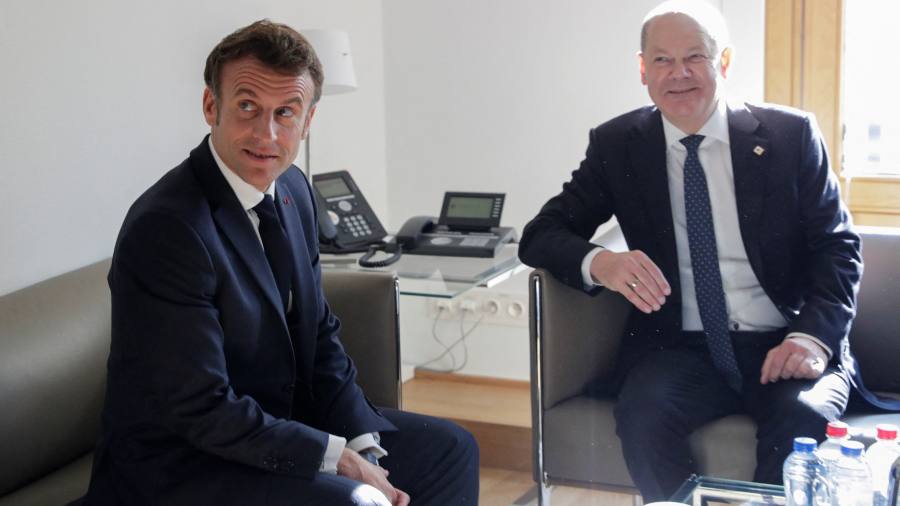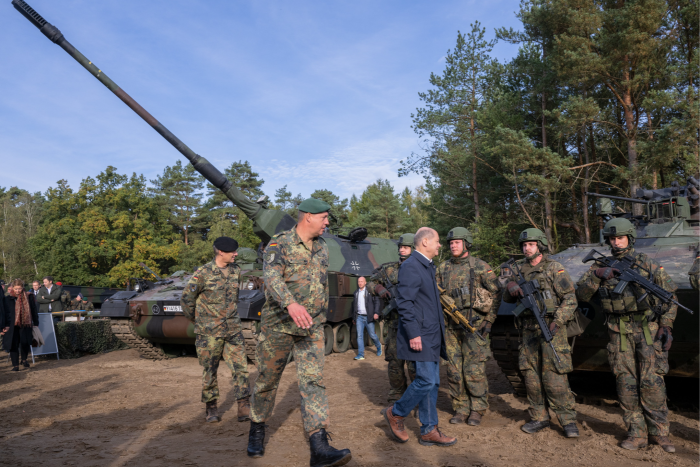
The relationship between France and Germany has long been the motor that drives the EU. Wednesday’s meeting between Chancellor Olaf Scholz and President Emmanuel Macron in Paris is a chance to put it back on the road after months of problems.
Franco-German tensions were laid bare at last week’s EU summit in Brussels, when Macron told reporters that Berlin risked “isolating itself” in Europe.
Although Scholz said he did not feel isolated “in any way”, the two countries were on opposing sides of an acrimonious debate over whether to introduce an EU-wide cap on gas prices. French finance minister Bruno Le Maire acknowledged that relations were “difficult” and required a “reset”.
“The war in Ukraine, the gas and energy question and the issue of China should lead us to a strategic redefinition of Franco-German relations,” he said ahead of the summit.
Officials in Berlin dismiss talk of discord. “We differ on some things but not on the really fundamental issues,” one said, adding that “on supporting Ukraine and helping companies affected by the war we’re very closely aligned.”
However Pierre Sellal, France’s former permanent representative at the EU, expressed concern that the two countries seemed incapable of working through their differences as they had in the past. “The machine to produce compromises appears to be blocked up,” he said in an interview.
The row over the gas price cap was emblematic of this, even though Scholz eventually dropped his opposition.
Germany and France would usually co-ordinate closely in the run-up to EU summits. Once an agreement is reached, their positions on key issues form a road map for European action.
But the absence of such carefully choreographed diplomacy at last week’s meeting was symptomatic of an increasingly fractious relationship. In recent weeks, Paris and Berlin have clashed over everything from fighter jets and air defence systems to gas pipelines.
The extent of the discord was laid bare last week with the postponement of a joint meeting of the French and German cabinets, which was due to take place on October 26. Officials blamed the tight schedules of senior ministers, but both sides admitted privately that more talks were needed on a number of dossiers.
Instead, Macron and Scholz will have a working lunch in Paris on Wednesday with a small group of aides. While defence and energy issues will be on the table, an Elysée source said Paris wanted a broader discussion aimed at hashing out a shared vision for the Franco-German relationship. “We need to ask the hard questions now on how we can drive forward European goals,” the person said.

Observers ascribe some of the tensions to Russia’s war in Ukraine, which has put the French and German economies under huge strain. Germany in particular is facing acute challenges to an economic model that has long been based on cheap Russian gas, low spending on defence and unlimited access to the Chinese market.
Macron told Les Echos this month that one “shouldn’t underestimate the destabilising nature” of the change in Germany’s economic and political model.
But in Paris, the concern runs deeper than short-term worries about Russia’s war and its economic impact. Doubts are creeping in about the overall direction of France’s relationship with Germany, as fears grow that Berlin is seeking to shift its focus eastward.
“The French worry that Germany will end up becoming closer to eastern Europe, with potential EU member states like Ukraine and the countries of the West Balkans, than it is to France,” said Jacob Ross, research fellow at the German Council on Foreign Relations (DGAP) think-tank. “And they fear that in the long term, that could strengthen Germany’s dominance in Europe.”
Concern about Germany’s outsized role in Europe partly explains the wariness in Paris and other European capitals about Scholz’s “double ka-boom”, the €200bn plan announced last month to protect households and businesses from high gas prices. Some saw the move, which Germany did not co-ordinate with its EU partners, as potentially distorting the bloc’s single market.
Defence strategy is another issue, as are recent decisions by Berlin on military procurement. Germany decided to spend part of its newly created €100bn investment fund for its armed forces on US F-35 fighter jets, a decision that irritated Paris.
Macron sees such moves as counterproductive to Europe’s long-term need to ensure more of its own defence. Paris is also frustrated about slow progress on the Future Combat Air System, Europe’s flagship defence project launched by Paris and Berlin in 2017 to bolster the continent’s military capability.
Nor did France appreciate Berlin’s announcement this month of a new air defence platform — the European Sky Shield Initiative — designed to close gaps in Nato’s protection of Europe’s air space. Fourteen countries, mostly in eastern Europe, signed up. France and Italy were not among them, although they have their own air and missile defence system.
“Germany is going it alone, even though there are European initiatives in this area,” said Valérie Hayer, an MEP from Macron’s Renaissance party.
Berlin has its own reasons to be irritated with Paris. German officials were exasperated by French opposition to the MidCat project, a gas pipeline over the Pyrenees that would have linked the Iberian and broader European energy markets. MidCat, which Germany had long championed, was buried last week, with France and Spain agreeing instead to build an undersea pipeline between the two countries.
Despite the proliferation of tensions, DGAP’s Ross said it would be wrong to call time on the Franco-German alliance that has long been essential to the proper functioning of the EU.
“Both governments realise that their bilateral relationship must open up and expand in the future,” he said. “But there is no serious alternative to it right now.”
Additional reporting by Sam Fleming in Brussels